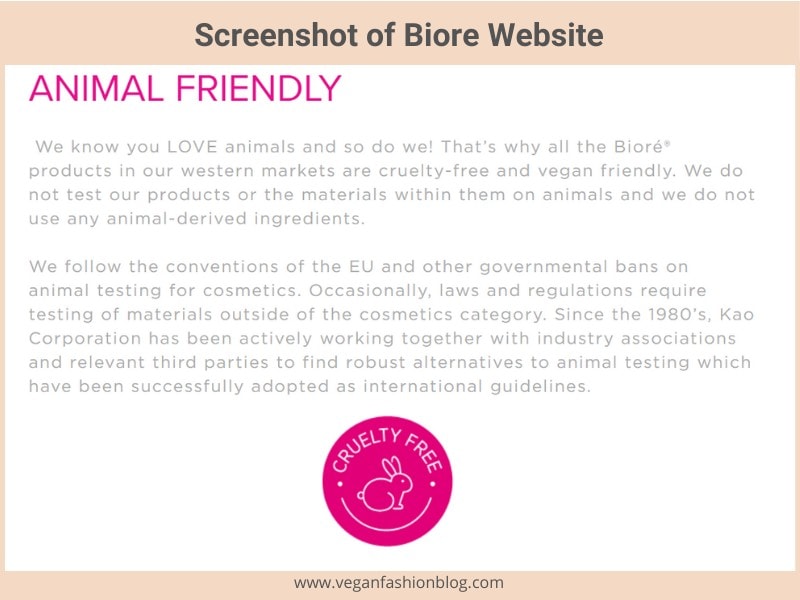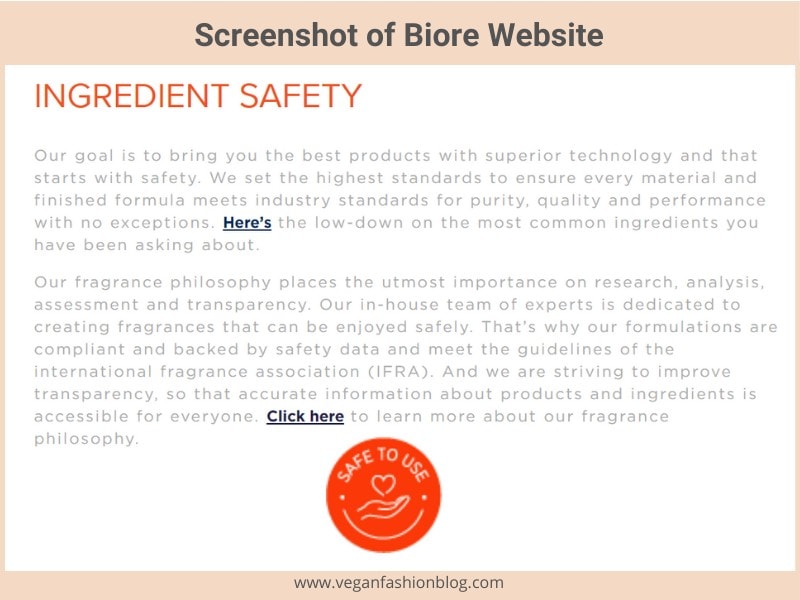Quick Answer: Is Biore Cruelty-Free and Vegan?
Contrary to what’s stated on their website, Biore is neither cruelty-free nor 100% Vegan. The brand sells its products in China and has to abide by the country’s strict animal testing policy. Hence, even if Biore doesn’t test its products on animals when they sell in the US and Japan, they carry out the testing when they have to sell in other countries.
Biore is a Japanese brand that specializes in skincare products. Most of their products serve as deep cleansing solutions and sell in over 70 counties.
Some of their most popular products UV protection, shower cream, make-up removers, and shower cream.
The brand’s headquarters is in Tokyo, Japan, and in 2019, were listed among the top 50 cosmetics brands by global cosmetics news.
Is Biore Cruelty-Free?
Biore has long claimed that they’re “cruelty-free” and 100% vegan.

Well, this isn’t new since most brands are fond of making such claims and doing otherwise. In the case of Biore, their cruelty-free claim is false and contradicts their dealings.
For a brand to be considered cruelty-free, it must satisfy two criteria.
First, it shouldn’t in any way test their products on animals, and secondly, they shouldn’t sell in countries where animal testing is compulsory by law. Biore didn’t meet this requirement.
The brand does sell in China, a country where animal testing is made compulsory for foreign brands.
Are Biore products tested on Animals?
Biore acknowledges the need for an animal-friendly environment and put up a statement on their website that goes like this:

However, this is contrary to what happens behind the scenes. Despite their “cruelty-free” claim, the fact that they sell in China means they test their products on animals as per the requirements of the Chinese market.
Do they test Animals when required by the Law?
Yes, most brands are required to test their products on animals when they sell in some Western countries. There are different rules for animal testing, but most countries in Europe kick against it.
In Asia, especially China, the rules are different. Animal testing is the safest way to ensure the product coming into the country is fit for human use with minimal side effects.
Are Biore Products sold in China?
Biore products are sold in China, and they’re one of the first few countries their products debuted in when they were first launched.
Of course, we know that brands who sell in the country have to test their products on animals before being allowed to do so.
It’s difficult for any foreign brand to bypass this strict policy the Chinese government has set. Hence, the reason that heavyweights like L’oreal, Maybelline, and Olay are also not cruelty-free.
Does Biore have Cruelty Free Certifications?
Biore made its debut in the US in 1997. For this reason, we can say they’re no longer new in the industry. Despite their long stay, they’re not recognized by PETA.
They don’t have any record with authority. A search on their cruelty status on PETA’s site led to a dead end.
Is Biore Owned by another Company?
Yes, Biore operates under a parent company. The brand is owned by Kao corporations, one of the largest producers of cosmetics products in Japan.
The company was founded in 1887 and is the proud owner of Jergens, Laurier, and Goldwell.
Are Biore Products Vegan?
Biore products are not 100% vegan. The brand maintains that its products don’t contain any form of animal-derivatives and went a step further to publish a comprehensive list of ingredients used in their products.
This is a bold step other brands should emulate. However, in the list of ingredients, we saw two elements that have received a lot of backslash from vegans – stearic acid and Glycerin.
Now, these two can be derived from both plants and animals, but we were left to decide that on our own since the brand wasn’t specific.
A look at 80% of their products indicates that they contain one of the two. Without a clear idea of their sources, it will be pure folly to declare that they’re “vegan”.
Summary
Biore is a significant player in the cosmetic industry. They do recognize the need to be cruelty-free but do bend their ethics when they have to sell in countries where animal testing is mandatory.
